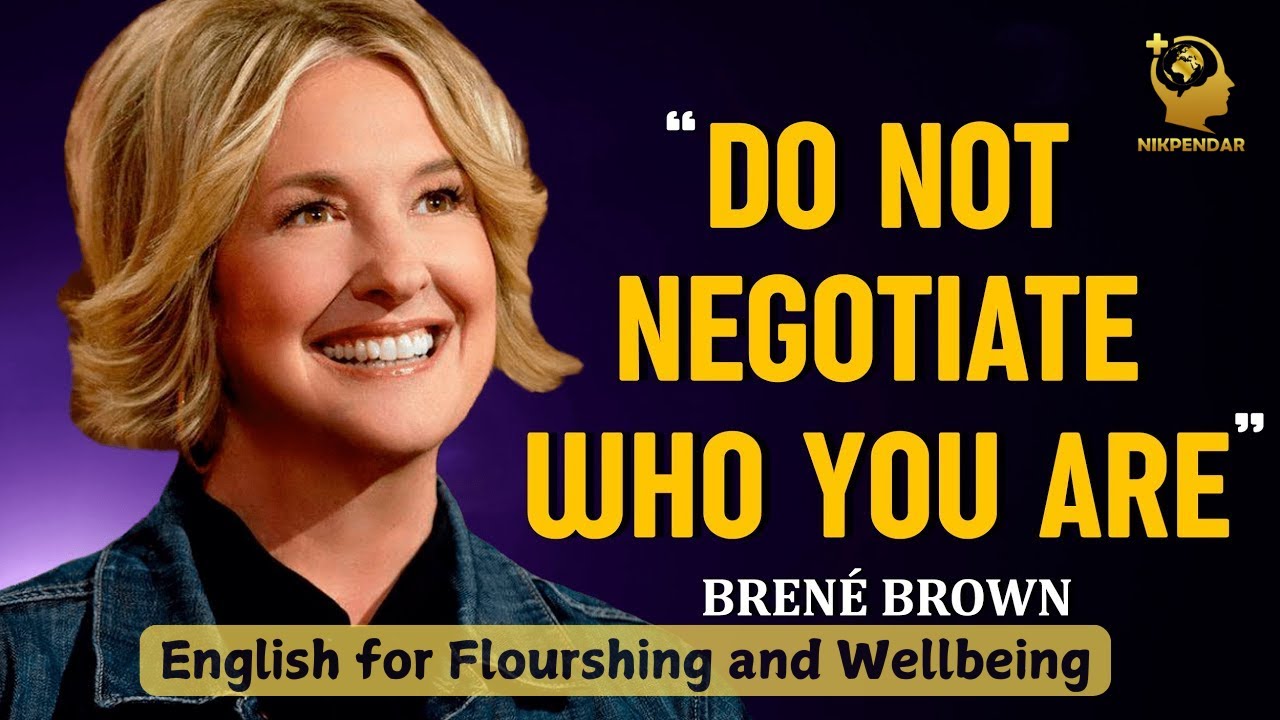
Beginner
Task 1: What is Belonging?
- The speaker talks a lot about belonging. What do you think “belonging” means?
- Do you like to belong to a group, like a sports team or a club? Why or why not?
- Practice: Speak for 30-60 seconds, using simple sentences and clear pronunciation.
Task 2: Being Yourself
- The speaker says, “I’m not going to negotiate who I am with you.” What do you think this sentence means in simple words?
- Why is it important to be yourself and not change completely for other people?
- Practice: Share your ideas in 2-3 sentences, focusing on getting your main point across.
Intermediate
Task 1: True Belonging and Standing Alone
- The speaker redefines true belonging. She says it’s about being part of something and having the courage to stand alone. Explain this idea in your own words.
- Can you think of a time when you had to stand alone or disagreed with a group, even if it was difficult? Describe that situation and how you felt.
- Practice: Speak for 1-2 minutes, trying to connect your ideas logically and use a variety of sentence structures.
Task 2: The Elements of Trust (BRAVING)
- The speaker introduces the BRAVING acronym, which lists seven elements of trust. Choose one element from BRAVING (like Boundaries, Reliability, Accountability, Vault, Integrity, Non-judgment, or Generosity).
- Explain what that specific element means.
- Why is this particular element important for building trust in your relationships with friends, family, or at work? Give an example if you can.
- Practice: Discuss for 1.5-2.5 minutes, providing clear explanations and supporting examples.
Advanced
Task 1: The Paradox of Belonging Everywhere and Nowhere
- The speaker initially struggled with the quote, “You’re free when you belong nowhere.” How does she resolve this apparent paradox by explaining true belonging as a “spiritual practice”?
- Discuss the deeper implications of this redefined concept of belonging. How might embracing both being part of a group and having the courage to stand alone lead to personal liberation and stronger, more authentic communities?
- Practice: Present a well-structured argument for 2.5-4 minutes, using advanced vocabulary, complex sentence structures, and effective transitions.
Task 2: “The Wilderness” Metaphor and Trust in Leadership
- The speaker uses the metaphor of “the wilderness” to describe challenging times when we feel uncertain or stand alone. How does she suggest the BRAVING model can be used as a tool to navigate this “wilderness,” particularly in the context of leadership and team dynamics within organizations?
- Choose three elements from the BRAVING acronym that you believe are most critical for a leader to embody to foster high levels of trust within a team or organization. Justify your choices with detailed examples, either hypothetical or from your own experience/knowledge.
- Practice: Engage in a detailed discussion for 3-5 minutes, demonstrating critical thinking, analytical skills, and the ability to apply abstract concepts to practical scenarios.
Beginner
Task 1: Belonging and Connection
Listen to the first part of the talk about “belonging.”
- What does the speaker say she knows for sure about love and belonging?
- What is “true belonging” not just about?
- What is “true belonging” about, according to the speaker?
- Keywords to listen for: belonging, love, suffering, stand alone, part of something
Task 2: Being Yourself
Listen to the part where the speaker talks about not negotiating who she is.
- What does she say she will negotiate with someone?
- What will she not negotiate?
- Why is it important for her to not negotiate who she is?
- Keywords to listen for: negotiate, who I am, betray, fit in, belong to myself
Intermediate
Task 1: Understanding “Antifragility” vs. “True Belonging”
The speaker mentions a quote that “pissed her off for decades” about being “free when you belong nowhere.”
- Why did this quote trouble her as a social scientist? What did she know for sure about belonging?
- How did she eventually understand “true belonging”? What does it mean to “belong everywhere in nowhere”?
- Based on her explanation, how is “true belonging” different from simply “fitting in”?
- Word Count Focus: Answer each question with 2-3 sentences.
- Concepts to listen for: belonging, love, suffering, spiritual practice, stand alone, part of something, liberation, fitting in, betrayal.
Task 2: The “BRAVING” Acronym for Trust
The speaker introduces “BRAVING” as an acronym for the seven elements of trust.
- Choose three elements from the BRAVING acronym (B, R, A, V, I, N, G).
- For each chosen element, briefly explain what it means in the context of building trust, based on the speaker’s explanation.
- Which of these three elements do you think is the most challenging for people to practice, and why?
- Word Count Focus: 150-200 words.
- Concepts to listen for: BRAVING (Boundaries, Reliability, Accountability, Vault, Integrity, Non-judgment, Generosity), trust issues, observable, measurable, challenges.
Advanced
Task 1: The Paradox of Vulnerability and Authenticity in Leadership
The speaker discusses her approach to leadership work, including her refusal to “wear a suit” or avoid talking about “cussing and praying.”
- Analyze why the speaker believes it’s crucial to be authentic, even when discussing potentially “inappropriate” or uncomfortable topics, in a corporate/public setting.
- How does her personal definition of “true belonging” (the courage to stand alone while being part of something bigger) influence her leadership style?
- Discuss the speaker’s advice “Don’t walk through the world looking for evidence that you don’t belong” and how it connects to her stance on self-negotiation. What are the potential consequences of “betraying oneself”?
- Word Count Focus: 200-250 words.
- Key Concepts to address: authenticity, vulnerability, corporate setting, personal values (faith, courage), true belonging, self-negotiation, betrayal, “fitting in” vs. “belonging to self.”
Task 2: Deconstructing Trust: Beyond “Trust Issues”
The speaker delves into the difficulty of addressing “trust issues” in organizations and introduces the BRAVING acronym.
- According to the speaker, why do people react defensively (“go completely limbic”) when confronted with “trust issues”? What is the core reason for this reaction?
- Choose four elements from the BRAVING acronym and explain how understanding these specific elements can lead to more productive and impactful conversations about trust, compared to simply saying “we have trust issues.” Provide specific examples from the transcript if possible.
- The speaker concludes with “I am the wilderness.” How does the BRAVING framework empower individuals to navigate this “wilderness” of uncertainty and stand alone when necessary?
- Word Count Focus: 250-300 words.
- Key Concepts to address: limbic response, prefrontal cortex, integrity, BRAVING (at least four elements with detailed explanations), specific examples of trust elements (e.g., Vault, Generosity), managing the wilderness, standing alone, self-reliance.
Beginner
Task 1: Understanding “Belonging” Read the first part of the transcript where the speaker talks about “belonging.”
- What did the speaker first think “belonging” meant (like having a “crew”)?
- What did she learn later that “true belonging” really means (two parts)?
- Circle or write down two words from the text that describe what she feels when she is not belonging: suffering, joy, comfort, anger.
Task 2: Being Yourself The speaker talks about being herself and not changing for others.
- What are two things she says she won’t do for others (e.g., wear a suit)?
- Why does she believe it’s important to be yourself? (Hint: “fit in for you but I no longer belong to myself”)
Task 3: What is Trust? The speaker talks about “trust.”
- Find the acronym she uses for the elements of trust. What is this acronym?
- Name three elements of trust from the list (e.g., Boundaries).
Intermediate
Task 1: The Paradox of “Belonging Everywhere and Nowhere” The speaker initially struggled with the quote “You’re free when you belong nowhere.” Later, she understood it as “You belong everywhere in nowhere and that is liberation.”
- Explain in your own words what the speaker’s initial confusion about the quote was.
- How did her understanding of “true belonging” (as a “spiritual practice” involving both being “a part of something” and having the “courage to stand alone”) resolve this paradox?
- What does “liberation” mean in this context?
Task 2: BRAVING Trust – Key Elements The speaker introduces the BRAVING acronym for trust. Choose three of the seven elements (Boundaries, Reliability, Accountability, Vault, Integrity, Non-judgment, Generosity).
- For each of your chosen elements, explain what it means in your own words, using examples or descriptions from the transcript to support your explanation.
- Why do you think these specific elements are important for building trust?
Task 3: Authenticity and Self-Betrayal The speaker talks about her refusal to “negotiate Who I Am” and the idea of “betrayal” if she fits in for others but no longer belongs to herself.
- Describe what the speaker means by “betraying myself.”
- What specific examples does she give of how she stays authentic in her work and public speaking?
- How has her past experience influenced her current stance on self-betrayal?
Advanced
Task 1: “I Am the Wilderness” – A Metaphorical Analysis The transcript concludes with the powerful statement: “I am the wilderness.”
- Analyze the metaphor of the “wilderness” as presented in the text. What does it represent in the context of personal growth and challenges?
- How does the BRAVING framework serve as a “tool to help us manage the wilderness”?
- Deconstruct the final statement, “I am the wilderness.” What deeper meaning does this convey about resilience, self-discovery, and inner strength? How does it connect to the overarching theme of standing alone?
Task 2: The Nuances of Confidentiality in Trust The speaker elaborates on the “Vault” element of BRAVING, going beyond simply not sharing secrets.
- Explain the speaker’s extended definition of “confidentiality in the vault.” What is the “other side of confidentiality” that she emphasizes?
- Why does sharing “stories that are not yours to share” (even if they are not secrets from you) decrease trust, according to the speaker? Discuss the psychological reasoning behind this.
- How does this nuanced understanding of the “Vault” contribute to a deeper, more robust definition of trust?
Task 3: The Interplay of Personal Values, Authenticity, and Professional Impact The speaker discusses her personal values (Faith and Courage) and her refusal to compromise her authenticity in professional settings.
- Analyze how her deeply held personal values directly influence her professional conduct and the way she delivers her message.
- How does her approach to communication (“talk about things that 90% of the people in the audience have never thought about”) align with her commitment to authenticity and potentially foster deeper connection with her audience?
- Discuss the speaker’s perspective on the relationship between personal integrity and professional impact, drawing evidence from her experiences with corporate work and public speaking.
Beginner
Task 1: What is Belonging?
The speaker talks about “belonging.” In your own words, what do you think it means to belong? Give an example of a time you felt like you belonged somewhere. Write 3-4 sentences.
- Keywords to use: belonging, feel, group, part of
Task 2: Being Yourself
The speaker says, “I’m not going to negotiate Who I Am with you.” What does this mean? Why is it important to be yourself? Write a short paragraph (4-5 sentences) about why being true to yourself is a good thing.
- Keywords to use: yourself, important, true, happy
Intermediate
Task 1: True Belonging: Part of Something and Standing Alone
The speaker describes “true belonging” as being both a part of something and having the courage to stand alone. Explain this idea in your own words. Why is it important to have the courage to stand alone, even when you risk disagreeing with a group you belong to? Provide an example from your own experience or a hypothetical situation.
- Word Count: 100-150 words
- Concepts to include: true belonging, courage, stand alone, disagree, group, example.
Task 2: Understanding Trust: One Element of BRAVING
The transcript introduces the “BRAVING” acronym for trust. Choose one element from BRAVING (e.g., Boundaries, Reliability, Accountability, Vault, Integrity, Non-judgment, Generosity). Describe what that element means in your own words, and explain why it is important for building trust in relationships, whether personal or professional.
- Word Count: 120-180 words
- Concepts to include: trust, chosen BRAVING element (e.g., Reliability), definition, importance, relationships.
Advanced
Task 1: The Paradox of Belonging and Liberation
The speaker initially struggles with a quote about being “free when you belong nowhere” because she believes belonging is essential for well-being. However, she later reinterprets it as “true belonging” being a spiritual practice of both connection and courageous solitude, leading to liberation. Analyze this evolution of understanding the concept of belonging. Discuss how embracing both connection and independence can lead to personal freedom and authenticity, drawing on the speaker’s insights about “not betraying myself.”
- Word Count: 200-250 words
- Key Concepts to address: paradox of belonging, “belong everywhere and nowhere,” true belonging, spiritual practice, courage to stand alone, liberation, authenticity, self-betrayal.
Task 2: Navigating the “Wilderness” with BRAVING
The speaker uses the metaphor of “braving the wilderness” to describe times when we stand alone or challenge established beliefs. She suggests the BRAVING acronym as a tool to manage this “wilderness.” Choose three elements from the BRAVING acronym that you believe are most crucial for navigating challenging personal or professional “wilderness” situations. Explain each chosen element and elaborate on how its application would specifically help someone to “make their way through the uncertainty” and “stand alone” without self-doubt.
- Word Count: 250-300 words
- Key Concepts to address: “braving the wilderness,” standing alone, uncertainty, chosen three BRAVING elements (e.g., Boundaries, Integrity, Generosity), detailed explanation of each, practical application in challenging situations, self-doubt.





